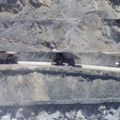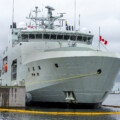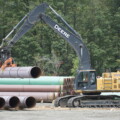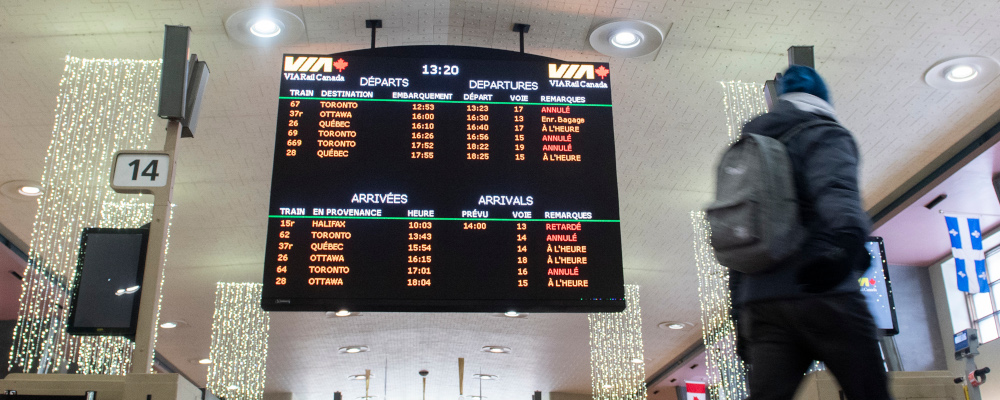I thought I was being clever. Christmas travel is awful at the best of times. With a huge storm crippling airports across North America, I decided to take the train from Toronto to Kingston on December 23rd. The plan was to get in a few days early to visit my parents and then my partner would get in on Christmas day. Then we’d head to Ottawa and Montreal by train for a relaxing vacation. Needless to say, things didn’t go according to plan.
All things considered, I was lucky. My train hit heavy delays after Cobourg. Eventually, we got stuck intermittently for about two hours until we finally hit Belleville and things started moving better. I got to Kingston about three hours late. It was a far cry from the 14-hour-plus delays people experienced a few trains later. Thankfully, my partner’s flight got stuck on the tarmac for only an hour.
People are understandably furious. Had I taken a later train, I suspect I would be as well. But I’m not sure there’s all that much Via could have been expected to do differently.
I take the train reasonably often. I once made the questionable decision to take it from Ottawa to Edmonton years ago. And I used to regularly take the train (or bus) from Sudbury to Toronto. It gives you a heightened appreciation of how big the country is, and how difficult it is to move people by land. You can go a long way on the train without seeing much other than trees and rocks.
The Windsor to Quebec City corridor is a bit different. While over a third of Canada’s population lives roughly on that corridor, it’s still a lot of land. And while you may be close to one town or the other a lot of the time, it isn’t always the case.
Moreover, most people travelling the Windsor to Quebec corridor aren’t actually going that far. There are more people doing relatively short trips like mine than doing the whole route. And even if you are, there are stops. So no need to plan for grueling delays, in most cases.
Given that most segments are short, most people don’t typically order meals. They are standard fare for business class, but even in the business cabin things run out. Trains are not equipped to feed everyone. The kitchens aren’t big enough, and they aren’t going to just let hundreds of meals spoil on each segment just in case.
You need to know all this to appreciate that Via was in a difficult position dealing with unusually long delays. There were some infuriating stories about the payment system being down, meaning people could only buy meals in cash. But even if that wasn’t the case, they almost certainly didn’t have a meal for every person on what was supposed to be a quick two-hour jaunt. So even if the crew decided to break the glass and just hand out meals, they probably would have just distributed them arbitrarily. I could be wrong, but if that is the case, rationing by cash might have been the least awful choice.
For those comparing this to air travel, no, airplanes aren’t ready for 14-hour delays either. They’d run out of fuel well before that. A few hours of delays and you’d be dead. So enough meals to go around isn’t a big priority there either.
One might also wonder why crews didn’t coordinate with management to arrange for food to be delivered to the trains. That might have been easier said than done. Management would have been stretched thin dealing with multiple stranded trains on the Windsor to Quebec corridor, let alone any other issues. The call centers were jammed for around 48 hours. It was chaos. It’s possible that middle management just failed to make the right decisions. It’s also possible they were just overwhelmed and communication channels broke down. And, of course, it’s possible they weren’t getting the information they needed from CN, which owns the tracks. We don’t know all the details yet, but it’s not hard to see how this could have come unglued without assuming malice or gross incompetence.
You also need to remember that these trains weren’t stopped at a station or in the middle of a city. And the weather wasn’t great. Whiteout conditions and 100 to 120 km wind gusts make already difficult logistics worse. Ever try to get an Uber in Toronto in a blizzard? Now picture that outside a town of a few thousand people at night during a crippling storm. Are restaurants even open at that time and in those conditions on a holiday weekend? It’s not always easy getting to a train in the middle of a forest.
It’s also worth thinking about the train crew themselves. They’re not the best-paid people in the world. And while they have some autonomy to make decisions, they aren’t management. I suppose they could have whipped out their credit cards and found some restaurant to deliver food (assuming the train was near a road and had cell phone service). But that’s a lot to expect.
For all they knew, it might have just been another twenty minutes. Or forty. Or sixty. At what point do you panic? You don’t want to be the guy who makes a hasty call right before the train starts back up. You are not paid for that if you’re working the Via train.
And for those suggesting they should just have let people walk off the train, ask yourself this question: do you want to be the guy who let granny freeze in the woods? People stuck on a train might overestimate how much better it would be to be outside. You probably don’t want to have to explain that to your boss.
You might also wonder whether Via should have been more prepared for a disaster. Maybe they should have loaded the overhead compartments with extra water and snacks. Maybe. But people don’t tend to get into full prepper mode when they’re used to things going relatively well.
You might also wonder why they didn’t just cancel trains in advance. While they might not have been able to predict a switch problem followed by a tree falling on a locomotive and a CN derailment, the bad weather was well-telegraphed. It isn’t easy to tell people they don’t get to go home for Christmas. But that might well have been the prudent thing.
People are rightly wondering whether there are lessons we can learn and if Via can do anything differently going forward. There likely are some operational changes they can make. That is beyond my expertise. But they are already taking some important steps to improve the Windsor to Quebec corridor. They just take time.
The most immediate thing they are doing is upgrading the fleet. Via is already testing new, more comfortable-looking trains. Presumably, they will also be somewhat more reliable. If this can cut down on delays and make those delays more tolerable, that will be a win.
The more important thing is the planned high-frequency rail plan. The faster travel times get most of the attention. That’s not surprising. Three hours and fifteen minutes from Toronto to Ottawa would be a big improvement. Depending on how early you arrive at the airport, that might only be an hour longer than flying from Pearson to Ottawa with less hassle. But the real story here is the new tracks they plan to build.
The CN derailment was an almost too perfect illustration of the daily problem Via faces. Via uses CN and CP tracks to provide passenger service. And freight has priority over passengers. If you’ve ever been on a Via train and felt it unexpectedly reverse, it was probably to accommodate freight trains. The new plan would build dedicated tracks between Toronto and Quebec City. That would not only mean that a CN derailment wouldn’t shut down Toronto to Montreal travel for two days, but it would also mean fewer delays and higher speeds in general.
Of course, infrastructure is only part of operating a passenger train service. Operations matter. Hopefully, Via will be better prepared in advance for this sort of thing in the future. Now that it has happened once, they should realize that it could happen again.
I’m filing this piece from a Via train to Montreal. Hopefully the rest of our itinerary goes well, as it usually does. If not, maybe I’ll get mad. But being angry is no basis for making public policy decisions.
It’s natural to see events through an ideological lens. But sometimes there isn’t a big lesson to be learned. If you see this episode as definitive proof that we should privatize Via Rail or nationalize CN, take a breath. Unfortunate events don’t always have to fit a grand narrative.
Sometimes bad things happen. Hopefully, we learn something useful. It just might not be anything groundbreaking or exciting.
Maybe they need to carry some extra non-perishable food and water in case of emergencies. Maybe they need more call centre staff (something you could also say about airlines, which were mostly unreachable during the storm). Or, we just need to surrender to the weather more often until we get better rail infrastructure. That may not be a satisfying answer, but the truth rarely is. Such is life.
Recommended for You

‘It’s really important that we make mining fashionable again’: Ken Ash on why mining is essential to creating a happy and secure Canada

DeepDive: The Kananaskis agenda: An action plan for natural gas

DeepDive: It’s time to end the boom-and-bust cycle of Canadian shipbuilding

Heather Exner-Pirot: No, we’re not done building pipelines in Canada



